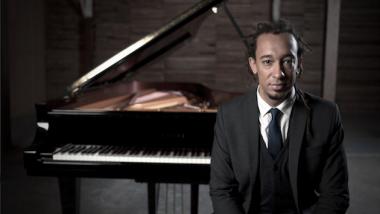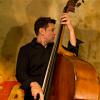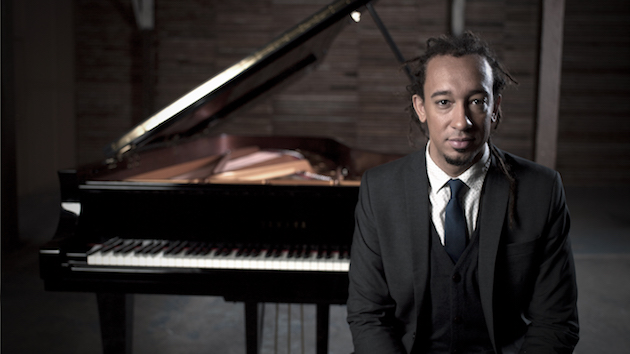
There’s a new generation of millennials who are adding new pages to the existing jazz canon. Blessed with the ability, at their fingertips, to listen to musical masters in a myriad of styles, from any decade, they are mixing genres and blurring boundaries between established musical categories, enriching the art form in ways never previously imagined.
Pianist and composer Gerald Clayton is among this group of gifted and inspirational, up-and-coming players. The 34-year-old son of acclaimed L.A. composer and bass player John Clayton, and nephew of alto saxophonist Jeff Clayton, he has recorded four albums and garnered four Grammy nominations in categories ranging from best improvised jazz solo, best instrumental jazz composition, and best instrumental jazz album. An artist who performs in a variety of configurations, he will be appearing at SFJAZZ on Saturday, April 20, and Sunday, April 21 in the Joe Henderson Lab, with a new standout trio featuring Anthony Wilson on guitar and Alan Hampton on bass. He will also be doing a Family Matinee performance at 11a.m. on Saturday, April 21 in the Miner Auditorium.
After spending the last 10 years in New York, Clayton returned to his native L.A. around a year ago, and is set to record a live album with a quintet at the Village Vanguard in New York on April 23–28. I caught up with him by telephone and we chatted about his life and career so far.
Tell me about your upcoming album.
I’ve been yearning to have something in my body of work that is an honest depiction of what I do all year long, which is play live shows, so I thought it was time for a live record. It will be fulfilling an old childhood dream of recording at the Village Vanguard.
I have gathered another group of guys who I really admire — a quintet with Logan Richardson on alto sax, Walter Smith III on tenor, Joe Sanders on bass, and Marcus Gilmore on drums. With guys like that, there’s only so much planning for me to do. I will put together a list of tunes, but try to keep it open, and know that throughout the week it’s going to morph and evolve, as any week at the Vanguard does. We just try to enter the sacred space and do the best we can and see what we get. I’m looking forward to having something in my discography that is a little more representative of that side of what we do.
Your father and uncle are professional jazz musicians. Did you ever consider or explore other kinds of music?
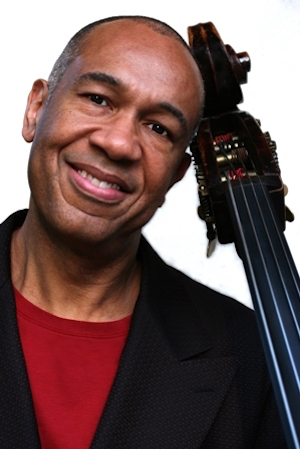
I like whenever the conversation gets into the words that we use to describe the music, because I think it’s just an invitation for us to pull out the magnifying glass and try our best to get at things with a little more nuance. I understand the need for categories and labels in our world, but the way I was raised around music, there was never any sort of a boundary.
At a young age I went to an arts high school and around then started getting hip to a lot of music that wasn’t in my collection — hip-hop, soul, and rock. And what I love so much about being an improvising musician, and what I have tried to take the word jazz to mean for myself, is that it represents a freedom, and with that freedom I am always looking for different influences and inspirations, musically and otherwise — not just jazz.
Do you think your generation has impacted or changed the nature of jazz?
I think that the music is a constantly evolving thing, so there’s really no choice but for it to change from generation to generation. If the music that’s being played is an honest expression of life, then that’s going to honestly reflect the change that has happened in life. I don’t get too much into cause and effect, I just look at what is happening and try to find music that I think is inspired and has integrity and that moves me. I try to encourage lovers of the music to just keep on digging and exploring both forward and backward.
You are a composer as well as a pianist. What is your process for composing?
Composition is still a very elusive dance partner, and I don’t ever feel like I am in control of that process. I am sitting down trying to figure out what note comes after this one or what chord, and sometimes it all comes out at once, and sometimes I have a seed of an idea and I leave it alone. Just yesterday I came back to something I hadn’t touched for a couple of months and liked it again.
What inspires your compositions?
Everything we do is informed by life in some way or another. It is something that is just a natural part of the artistic process. If I have a gig with Logan Richardson, I am thinking about his expression and my conversations about life with him, and his sound, and how to me it evokes something mystical in a yearning way, so let me write a melody that I think he would dig, that would get to some of his essence. I like the reward of hearing an idea turn into life by the musicians.
Tell me about your process for improvisation. Does it change considerably when you work with different players?
Things are always changing depending on the musicians you are playing with, the environment and the instruments you are playing. Maybe there is something deceiving about the word improvisation — people think we are creating something out of thin air — that it starts with nothing and then all of a sudden, we magically put together these notes. But no — it’s a language.
Essentially, we are telling a story and having a conversation, and just like any conversation, somebody might interrupt you, and you sort of roll with that, and somebody throws something else into the mix and then you explore that and you go down another wormhole.
We have a melody and we play it and there is an accompanying bass note and harmony, and then we improvise over that melody. Then you can start to explore how many things you want to break apart — change the melody, change the harmony, the bass note, the form — all those things are free. If I am going to use the word jazz — it means freedom — you have the freedom to do whatever you want with it, but there’s still a lot of structure and a lot of study that goes into just being able to speak the language you are using to improvise with.
Would you say that an individual’s creative instinct is what differentiates one player from another?
I think instinct is a good word to use. What I teach when I go to schools or camps and do master classes is that the only two things we can concern ourselves with as improvising musicians is playing with clarity, and playing with honesty. The clarity category is all the technical aspects of music — the rudiments of the instrument, the craft, as well as the language, and then the rest of it is playing what you’re hearing, and only that, and not letting yourself go beyond the reaches of what you want to say.
That can be humbling for students because maybe they only hear one note. But I think there is something a lot more moving about somebody playing one note with heartfelt honesty than playing a whole lot of notes and trying to convince the audience that they are really hip.
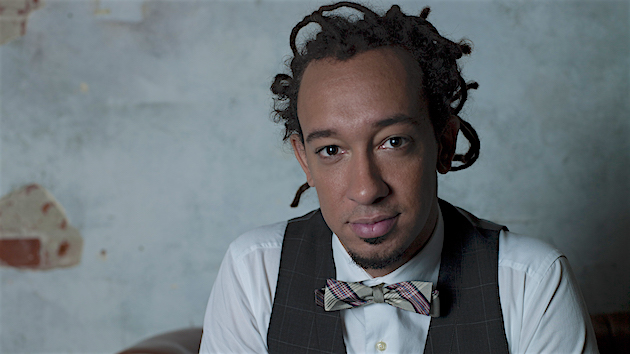
You have been commissioned to do several large works: “Piedmont Blues: A Search for Salvation”for Duke University and “Charles White: A Retrospective,” for the Los Angeles County Museum of Art. Tell me about those experiences.
Doing these kinds of pieces puts me back into a real student role. A big part of the project is learning about something I didn’t know about. For Piedmont Blues, it was spending two years learning about a history that I was unaware of and making multiple trips to South Carolina and meeting with elders who come from that tradition and talking with historians. That’s been a really rewarding part of the process for me because I get to walk away with a whole new bag of information and a connection to something that I didn’t have before.
You have a sense of purpose and your hopes and aspirations for the project take on a different feeling compared to just putting together a set of music at a club, because you want to serve the subject with as much integrity as possible. But that is probably just indicative of the artistic process — dancing with your own goals and aspirations and accepting some of the things that fall short, etc.
I think trying to tackle projects like this is a way of entering that world of trying to do more than just write some tunes that express my ego — because they have some kind of purpose or can effect some kind of change or at least start a conversation in the community in a different way.
How do you balance your busy schedule and your personal life?
I’m just at a point right now where I am looking back at the past 15 years of my life and noticing how busy I have been traveling. I have a system and I know how to do it, and I still really appreciate the chance to be a diplomat for my fellow musicians and for my country and my people. I take on the responsibility with a great sense of pride and respect, but at the same time I really love digging my feet into the sand, so to speak, and I am trying to find a way to balance these things.
In terms of your own development, where would you like to see yourself go?
A lot of different places. I am searching for more answers in the music always, and there’s something about that, that puts coal into the engine constantly. I also look back at these commissions and other projects and am inspired and encouraged to do more of those.
There’s also a goal for myself that has more to do with life outside of music and trying to find a way to tap into something that I am really connected to as deeply as I feel like I am connected to music. I’m really into surfing, and I want to do more of that, and I want to find a way to actually be able to sink my feet in the sand a little more as well.
Is that why you moved back to L.A.?
It’s a big reason. If I want to surf, I better do it now — before I’m too old to do it!

